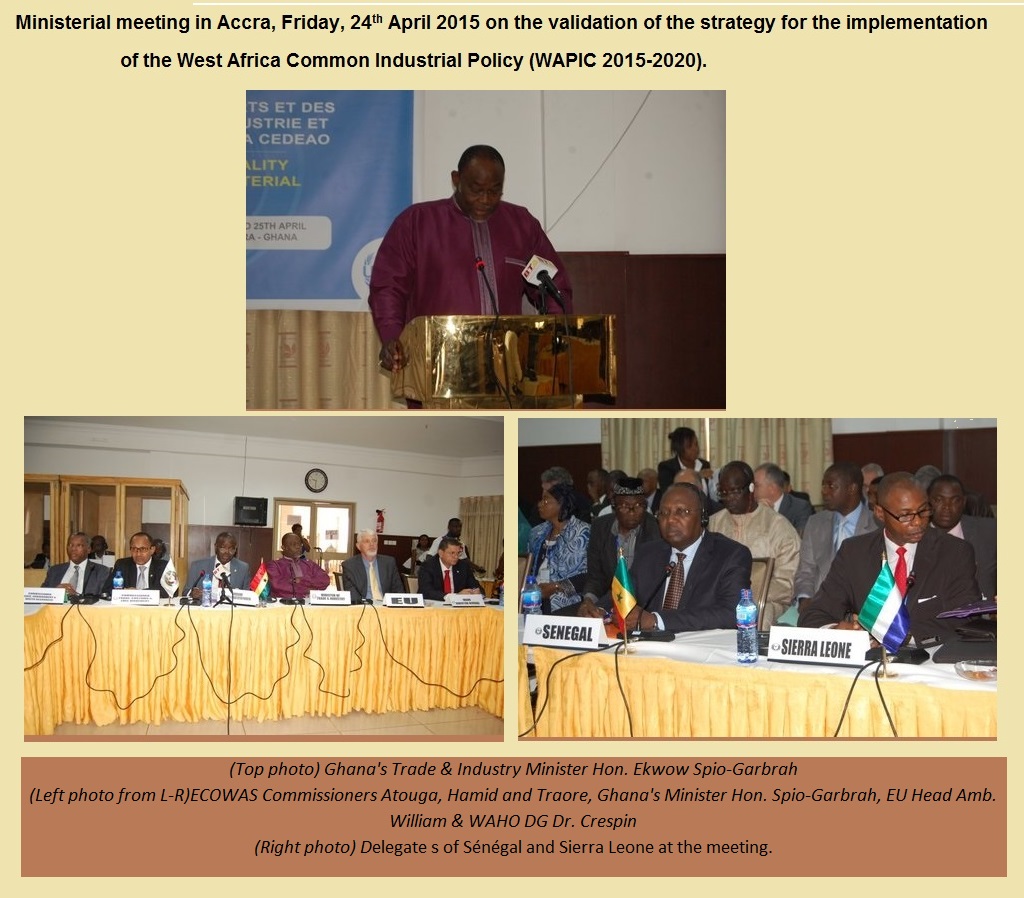Call for creativity, innovation driven industrialization of West Africa
| West Africa has to leverage its abundant human and natural resources with creativity and innovation to fast-track industrialization, economic development and regional integration, Ghana’s Minister of Trade and Industry, Honourable Ekwow Spio-Garbrah has urged.“
Our integration is an essential instrument for faster collective growth and prosperity,” the Minister said at the opening of a ministerial meeting in Accra, Friday, 24th April 2015 on the validation of the strategy for the implementation of the West Africa Common Industrial Policy (WAPIC 2015-2020). He stressed that regional integration as “a central pillar of our development strategy… is now a necessity rather than a choice,” noting that the meeting, preceded by a three-day experts session, was taking place at a time when the region “is faced with serious economic challenges due primarily to falling commodity prices and foreign exchange receipts, depreciation of currencies, and rising cost of capital, among others.” The situation, the minister said, “is equally compounded by rising unemployment due to downsizing by existing firms, particularly in the sectors that generate the bulk of our resources which are mostly in the agricultural sector and in the extractive industries.” Calling for greater priority to be placed on industry and related services which “drive the expansion of economies by spearheading economic growth, nurturing entrepreneurship, creating technological dynamism, fostering productivity, generating employment and contributing to agricultural productivity”. He said, emphasis should also shift from “how things are made to how to make them” “The time for action is now,” he affirmed, adding that “evidence has shown that countries that have prioritized industrialization as a driver of economic development have succeeded in attaining high levels Gross Domestic Products (GDPs) and per capita income,” which enables such countries “to reduce poverty, provide sustainable employment opportunities and generally achieve high standards of living for their citizens.” In his opening remarks, the ECOWAS Commissioner for Industry and Private Sector Promotion, Mr, Kalilou Traore said the recognition of the limited results of various national industrial development policies by Member States without regional coordination had informed the adoption by ECOWAS leaders of WACIP 2010-2030 with the accompanying revised strategy for its implementation. He listed the benefits of regional industrialization to include sustainable economic growth and development, poverty reduction, food security, job creation, improved security and well-being of the population. Acknowledging the support and contributions of development partners including the European Union, World Bank, UNECA and UNIDO among others, Commissioner Traore said the WACIP initiative is consistent with regional measures for the mobilization of public investment and private sector investors. The ministers will consider and adopt the report of the experts meeting on a number of issues, including validation of the Revised Strategy for Industrial Development (2015-2020); an ECOWAS Industrial Database and Information System framework; Support for the implementation of the third-phase of the West Africa Quality Programme; validation for adoption of the ECOWAS Harmonized Standards (ECOSTAN) and support of development partners in the area of agro-industry value chains and construction industrial. The Head of the European Delegation Ambassador William Hanna, noted that beyond the conclusions of the Economic Partnership Agreement (EPA) between West Africa and the EU, the region had been made “good progress” over the years through ECOWAS and UEMOA in the economic integration agenda, including the ECOWAS Common External Tariff (CET), the ECOWAS Quality Policy, the ECOWAS Investment Codes and the adoption of WACIP. He commended the ECOWAS Commission for the progress, adding that “competitiveness and trade are key priorities of the EU cooperation in West Africa.” Amb. Hanna stressed that “a partnership approach is required for the implementation of the industrial policy,” explained that “the partnership must involve the governments, the private sector, Civil Society Organizations, financial institutions and the development partners.” Also present at the opening ceremony were the ECOWAS Commissioners for Trade, Customs and Free Movement Mr. Hamid Ahmed, and Agriculture, Environment and Water Resources Dr. Lapodini Marc Atouga and Dr. Xavier Crespin, Director-General of the West African Health Organization (WAHO), the ECOWAS Specialized health agency. Directorate of Communication |




